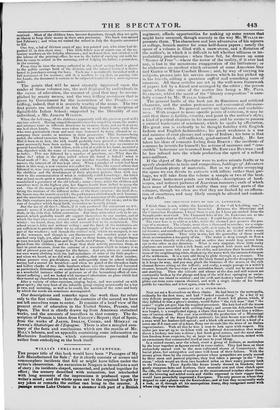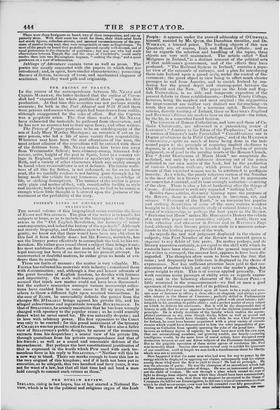WILLIS'S INKLINGS OF ADVENTURE.
THE proper title of this book would have been "Passages of My Life Manufactured for Sale ;" for it chiefly consists of scenes anti commonplace incidents that fell or might have fallen under the writer's observation. An excursion to Niagara is turned into a sort of story ; its incidents shaped, connected, and patched together for effect; the scenery described with animation, but interlarded with long accounts of the impressions it produced upon the writer's mind ; and the whole spun out to the required length by any jokes or remarks the author can bring to the muster. A passage across Lake Ontario in a steamer with part of a British regiment, affords opportunities for making up some scenes that might have occurred, though scarcely in the way Mr. W ws re- presents them. The characters and love adventures of his sojourn at college, furnish matter for some half-dozen papers ; nearly the space of a volume is filled with a snow.storm, and a flirtation of the author's, in which it is difficult to tell whether silliness or im- probability predominates : when these fail, he dresses up some it Scenes of Fear"—where the terror of the reality, if it ever had any, is lost in the monstrous exaggeration of the litterateur; or he elaborates an incident which occurred at some American Star and Garter or White Conduit House ; and, by way of varying his subjects, presses into his service stories which he has picked up in his travels, adding a quantum suilicit and something more of romance. All these articks are set in the well-worn framework of papers left by a friend and arranged by the editor ; the person upon 15 hem the onus of the matter lies being a Mr. PAUL SI.INGsIIV, whilst the merit of the "literary composition" is care- fully claimed by Mr. WILLis himself. The general faults of the book are its flimsiness and artificial character, and the undue pretensions and coxcomical obtrusive- ness of the writer. Its general merits are lightness and readable- ness. With respect to more specific points of criticism, it may be said that there is facility, vivacity, and point in the author's style; a kind of poetical elegance in his manner; and he seetns to possess a natural tenderness of sentiment, which lie spoils by affectation. His great aim is evidently to he thought familiar with English fashion and English fashionahles ; his great weakness is a use and missuse of cant phrases and scraps of Italian; his tone is that of an under-bred, self-sufficient, good-natured dandy. He has taken Isis ideas of romantic feeling from BYRON; the incidents of romance he invents for himself; his notions of manners and " irre- sistible " behaviour are borrowed from Mr. EDWARD BUI.WER ; and lie has infused into the whole production the spirit of a refined man-milliner.
If the object of the Spectator were to notice minute faults or to specify absurdities in taste and composition, Inklings of Adventure would furnish plenty of materials. But as we prefer occupying the space we can devote to extracts with tidbits rather than gar- bage, we will take from the volume a sample or two of the best. And these bettermost points are twofold,—descriptions of land- scapes, and indirect pictures of American manners ; each of which have more of freshness and reality than any other parts of the volumes, though we often see that they are dashed by an affecta- tion of smartness, and may likely enough be altered and cooked- up for effect.
THE THOUSAND ISLES OF THE sT. LAWRENCE.
I think there is not, within the knowledge of the " all beholding sun," a
spot so singularly arid exquisitely beautiful. Between the Mississippi and. the Cimmerian Bosphorus, I know there is not, for I have pie-nicked from the Symplegades westward. The Thousand Isles of the St. Lawrence are as im- printed mm my mind as the stars of heaven : I could forget them as soon.
The river here is as wide as a lake, while the channel just permits the pas- sage of a steamer. The islands, inure than a thousand in number, are a singu- lar formation of flat, rectangular rock, split, as it were, by regular mathemati- cal fissures, and overflowed nearly to the tops, which ale lo.aled with a most luxuriant vegetation. They vary in size, but the generality of then' would about accommodate a tea-party of six. The water is deep enough to float a large steamer directly at the edge, and an active deer would leap across from one to the other in any direction. What is very singular, these little rocky platforms are covered with a rich loam, and carpeted with moss and flowers, while immense trees take root in the clefts, and interlace their branches with those of the neighbouring islets, shadowing the water with the unsunned dimness of the wilderness. It is a very odd thing to glide through in a steamer. The luxuriant leaves sweep the deck, and the black funnel parts the drooping sprays as it keeps its way, and you may pluck the blossoms of the acacia or the rich chesnut flowers sitting on the taffrail ; and really, a magic passage in a witch's steamer, beneath the tree-tops of an untrodden forest, could not be more novel and startling. Then the solitude and silence of the dim and still waters are continually broken by the plunge and leap of the wild deer springing or swim- ming from one island to another ; and the swift and shadowy canoe of the Indian glides out from some unseen channel, and with a single stroke of his broad paddle he vanishes, and is lost again, even to the ear.
COMPANY IN A STEAM-BOAT.
Near me sat a Kentuckian on three chairs. Ile had been to the metropolis, evidently for the first time, and had " looked round sharp." In a fist of no very delicate proportions was crushed a pair of French kid gloves, which, if they fulfilled to him a glove's destiny, would flatter " the rich man" that " the camel" might yet give him the required precedent. His hair had still the traces of having been astonished with curling-tongs ; and across his Atlantean breast was looped, ia a complicated zigzag, a chain that must have cost him a wilder- ness of racoon-skins. His coat was evidently the production of a Mississippi tailor, though of the finest English material ; his shirt. bosom was ruffled like a swan with her feathers full.spread ; and a black silk cravat, tied in a kind of a curse-me-if-I. care-sort- of-a-knot, flung out its ends like the arms of an Italian improvisatore. With all this he was a man to look upon with respect. His under. jaw was set up to its fellow with an habitual determination that would throw a hickory tree into a shiver ; but frank good-nature, and the most abso- lute freedom from suspicion, lay at large on his Ajacean features, mixed with an earnestness that commended itself at once to your liking. In a retired corner, near the wheel, stood a group of Indians, as motionless by the hour together as figures carved in toss° antic°. They had been on their melancholy annual visit to the now. cultivated shores of Connecticut, the burial, place, hut unforgotten and once wild home of their fathers. With the money given them by the romantic persons whose sympathies are yearly moved by these stern and poetical pilgrims, they had taken a passage in the" fire- canoe," which would set them two hundred miles on their weary journey back to the Prairies. Their Apollo-like forms loosely dressed in blankets, their gaudy wampum-belts and feathers, their muscular arm and close clutch upon the rifle, the total absence of surprise at the unaccustomed wonders about them, and the lowering and settled scorn and dislike expressed in their copper faces, would have powerfully impressed a European. The only person on whom they deigned to cast a glance was the Kentuckian; and at him they occasionally stole a look, as if, through all his metropolitan finery, they recognized metal with whose ring they were familiar. There were three foreigners on board, two of them companions, and one ap patently alone. With their coats too small for them, their thick-soled boots and sturdy figures, collarless cravats, and assumed unconsciousness of the pre- sence of another living soul, they were recognizable at once as Englishmen. To most of the people on board they piobably appeared equally well-dressed, and of equal pretensions to the character of gentlemen ; but any one who had made observations between Temple Bar and the steps of Crockford's, would easily resolve them into two Birmingham bagmen, "sinking the shop," and a quiet gentleman on a tour of information.
Inklings of Adventure contain verse as well as prose. The poems are mostly connected with the papers in which they are introduced; and, in spirit, have similar characteristics; possessing fluency of diction, harmony of verse, and mechanical elegance of sentiment. But they want pith and originality.



























 Previous page
Previous page